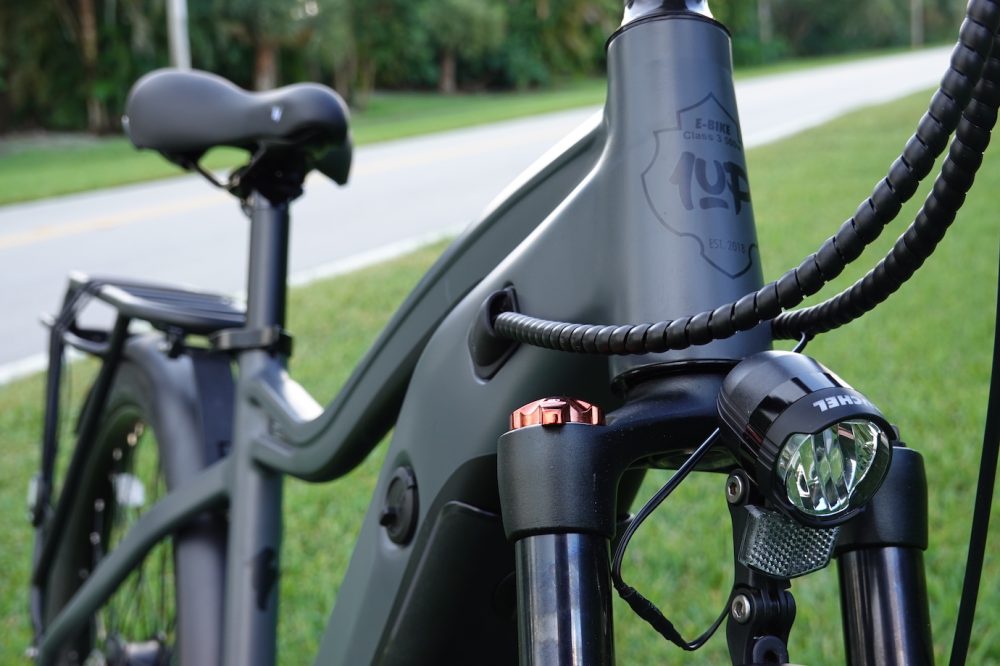Ever since I began riding electric bikes from Ride1Up back in 2018, I’ve found that the company does two things very well. First, it makes classic-looking e-bikes that perform even better than they look. And secondly, it does so for a price that leaves me scratching my head wondering how they can sell it for that little. The Ride1Up 700 Series is a perfect example on both counts.
Right out of the box, this urban-assault commuter e-bike has everything a rider needs for a potent city e-bike.
Perhaps most importantly of all, it’s got the speed and power to hang with the cars on the road.
While I don’t mind a Class 2 e-bike, I often feel like I hit a wall at 20 mph (32 km/h) when the motor assist cuts out.
The Ride1Up 700 Series is a Class 3 e-bike and thus can send me right up to 28 mph (45 km/h), as long as I give it some honest pedal-assist above Class 2 speeds.
While that rear hub motor may claim a continuous rating of just 500W, it is paired with a 22A controller and 48V battery to provide just over 1,000W of peak power draw. That results in powerful acceleration, whether you’re relying on the throttle or going halfsies with the pedal assist.
Before I dive too deep into this review, be sure to check out my testing video below. There you’ll see me putting the Ride1Up 700 Series through some real-world commuting-style riding. Then read on for the rest of my thoughts!
Ride1Up 700 Series video review
Ride1Up 700 Series tech specs
- Motor: 1,000W peak (500W continuous) hub motor
- Top speed: 28 mph (45 km/h)
- Range: 30-50 miles (50-80 km)
- Battery: 48V 14Ah (672Wh) with Samsung cells
- Weight: 62 lb (28 kg) with rack, fenders
- Load Capacity: 275 lb (125 kg)
- Frame: Aluminum alloy
- Brakes: Tektro dual-piston hydraulic disc brakes
- Extras: Color LCD display with speedometer, battery gauge, PAS level indicator with five-speed settings, odometer, trip meter, Shimano 8-speed transmission, front and rear LED lights, included high-quality rack and fenders, choice of step-over or step-thru frame
- Price: $1,695

Outfitted for riding, right out of the box
I always get a bit annoyed when I see e-bikes that are obviously designed for city riding but don’t include important city-specific accessories like lights, fenders, or racks.
I know there’s an argument to be made that not everyone needs the last two (though the belief that all e-bikes should come with included lighting is a hill I’m prepared to die on).
But fenders and racks are so useful that I believe they are basically required equipment for commuter e-bikes. Even if you live in a low rain area, the occasional puddle from irrigation or the errant hose can still leave you with unexpected tire spray. And even when I’m backpacking it instead of loading gear onto a rear rack, the fact that it is there often helps keep my bag from hanging down close the wheel.
In the case of the Ride1Up 700 Series, this e-bike offers the trifecta. Bright lights, high-quality hardened alloy fenders, and a pannier-ready rear rack that is rated for a robust 50 lb (23 kg).
In addition to those three key accessories that come as standard equipment, other commuter-friendly components include the Schwalbe SUPER MOTO X 27.5 x 2.4 tires (one of my favorite on-road tires), powerful dual-piston hydraulic disc brakes, and a Shimano Acera derailleur on an eight-speed cassette.
Are there better transmissions than the Acera? Yes. But is it good enough for 95% of us.
And between those big Schwalbe tires and the 100mm of travel in the front fork (complete with hydraulic lockout), the ride is urban jungle-ready. Potholes and curbs sometimes simply have to be taken head-on, so big tires and bigger suspension are a godsend in those cases. There’s no rear suspension on the Ride1Up 700 Series, as that would be a big ask for a commuter bike (though not unheard of). But at least the Selle Royal gel saddle adds a bit more comfort in the rear.
I’m pretty jazzed about the commuter loadout here, though there is, of course, room for improvement. The cadence sensor is fine, but I got spoiled by the nicer torque sensor on the Ride1Up LTM’D. If they had included a torque sensor on the 700 Series, that would have been sweet! Though considering the bike is priced at $1,695 and includes accessories like lights, fenders, and a rack as standard equipment, I can see how a torque sensor didn’t make it into the budget on this one.
And what’s with that left side throttle? Call me old-fashioned, but I much prefer a right-side throttle. I know the trigger shifter means you can’t have a thumb throttle on the right side, but why not go with a half-twist throttle? Not only is it my favorite style, but it also happens to be the best style as well (according to me).
But what about the electrical side?
So the bike is well-spec’d, sure. But what about the electronics?
Ride1Up pretty much nailed it there too.
The powerful motor and fast top speed of 28 mph (45 km/h) combine to give confidence-inspiring performance. I have no qualms about taking the lane in a city scenario, since I know I have the power to back it up. But when the traffic gets tight, I can easily slide back into the bicycle lane and be a cyclist (traveling at reasonable speeds based on the scenario, of course).
And the 48V 14Ah battery offers sufficient range, though I can’t say it’s the largest battery I’ve seen. With 674 Wh of capacity, the battery is rated for between 30-50 miles of range. The standard disclaimer of “you’ll only get the max range on the lowest pedal assist setting” certainly applies here, and you should know that getting throttle happy really eats into your range. But few commutes are going to be longer than 30 miles – and the ones that are rarely get performed by bicycle anyways. So the battery seems sufficient for the role.
The fact that the battery is also integrated into the frame is another plus for the Ride1Up 700 Series. Not only does it look slick, but it also helps cut down on theft, being much harder to steal.
It’s those little details that all seem to add up on this e-bike: The nicely designed and integrated components, the beautiful cable management to prevent a rat’s nest of wires on the bars, the color LCD screen, the gel saddle. The little extra pieces here and there go above and beyond what we typically see in this mid-level price range for e-bikes.
At $1,695, you really get a lot for your money here. At this price, it’s a great deal for a fast, powerful road-ready bike with all of the necessary commuting equipment.
The small complaints I had were few and far between. Ride1Up did an excellent job with the design and execution of the 700 Series, and it shows.
Subscribe to Electrek on YouTube for exclusive videos and subscribe to the podcast.












